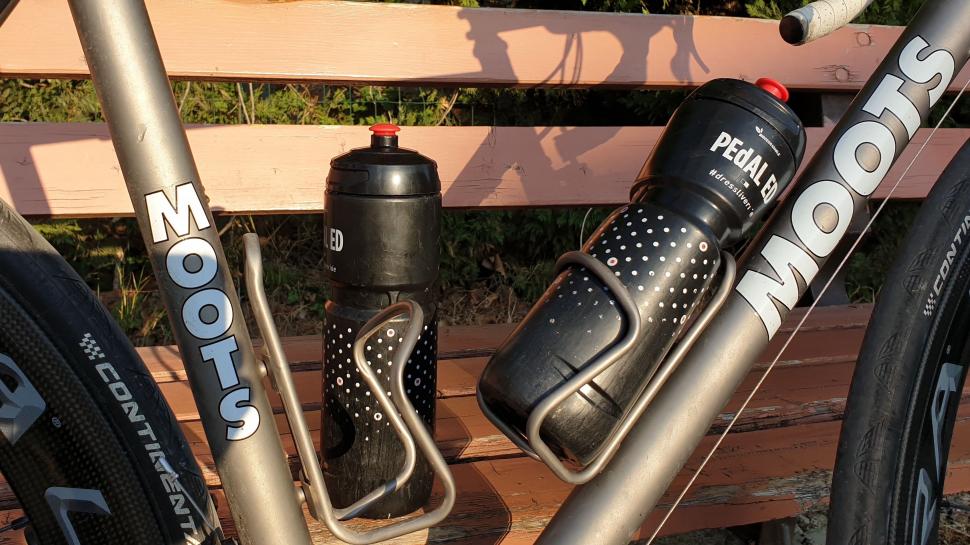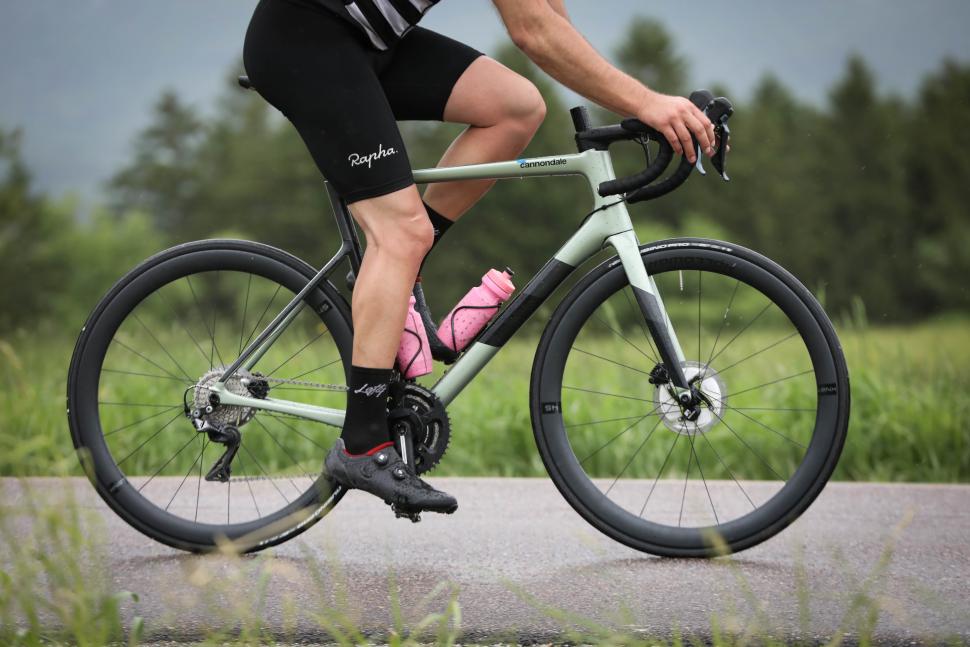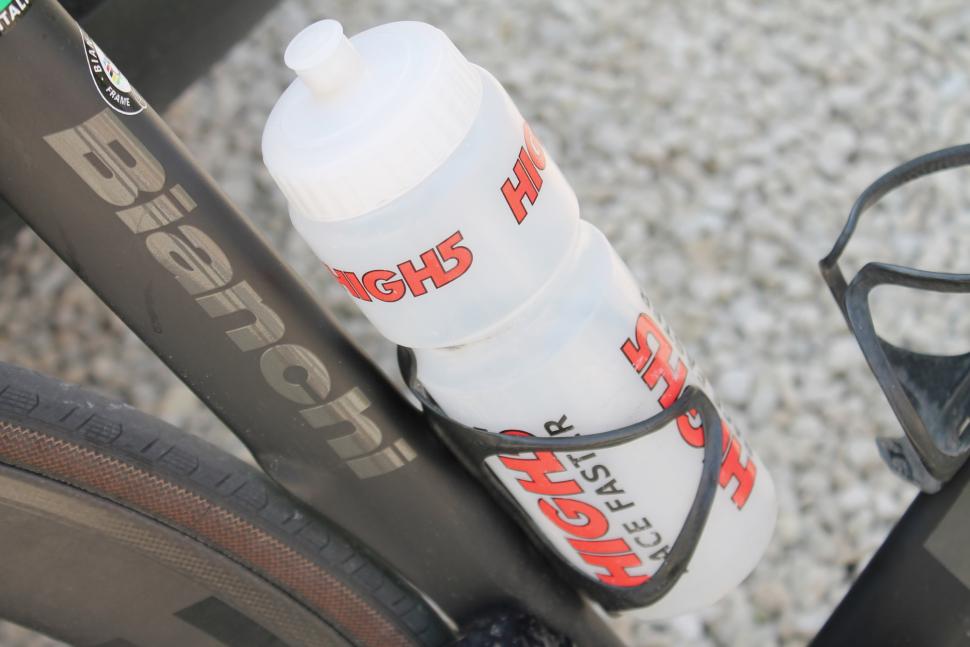- News
- Reviews
- Bikes
- Accessories
- Accessories - misc
- Computer mounts
- Bags
- Bar ends
- Bike bags & cases
- Bottle cages
- Bottles
- Cameras
- Car racks
- Child seats
- Computers
- Glasses
- GPS units
- Helmets
- Lights - front
- Lights - rear
- Lights - sets
- Locks
- Mirrors
- Mudguards
- Racks
- Pumps & CO2 inflators
- Puncture kits
- Reflectives
- Smart watches
- Stands and racks
- Trailers
- Clothing
- Components
- Bar tape & grips
- Bottom brackets
- Brake & gear cables
- Brake & STI levers
- Brake pads & spares
- Brakes
- Cassettes & freewheels
- Chains
- Chainsets & chainrings
- Derailleurs - front
- Derailleurs - rear
- Forks
- Gear levers & shifters
- Groupsets
- Handlebars & extensions
- Headsets
- Hubs
- Inner tubes
- Pedals
- Quick releases & skewers
- Saddles
- Seatposts
- Stems
- Wheels
- Tyres
- Health, fitness and nutrition
- Tools and workshop
- Miscellaneous
- Buyers Guides
- Features
- Forum
- Recommends
- Podcast
feature
 One bottle or two
One bottle or twoCycling hydration: Is 1 water bottle or 2 best on long rides?
Bechdan posed an interesting question on the road.cc forum:
"I find it hard to bring myself to add the weight of an extra water bottle (0.75kg) on long rides, having spent plenty of time and money on getting my bike light and efficient. But I also know the engine won't function without water.
"What is more efficient, stopping to refill or carrying the extra weight?"
This got us having a chat among the road.cc team, and we thought we'd share what we think. It's just a bit of fun but let us know in the comments down below if you reckon we've missed anything important.
As Bechdan says, your engine won't function without water. You'll obviously grind to a halt sooner or later if you don't drink – that's life! If you struggle to refill your water bottles when you need to, your performance could suffer, in which case you've clearly pushed things too far and you'd have been better off carrying the extra water in the first place. We'll take that as read.
For the purposes of this, we'll assume that you can refill your water bottle more or less when you need to.
Right, will the time gains you make from reducing weight by carrying just one water bottle instead of two be greater than the time spent stopping to refill more frequently?
Working out the answer is complicated because a whole load of different factors are involved. Adding mass by carrying extra water affects rolling resistance and speed, and speed in turn affects aerodynamic drag...
Luckily, other people have done the heavy lifting by creating online bicycle performance prediction calculators. Phew! Bike Calculator is one of our favourites.
Essentially, you can punch in figures covering to a whole load of different variables (rider and bike weight, distance, gradient, and so on), and get a predicted time out of the other end. This is exactly what we need to answer Bechdan's question.
Here's how Bike Calculator works.
Assumptions
• We'll assume that the aerodynamics of the bike and rider are the same whether they have one water bottle on the bike or two. Clearly, there will be a small difference, but we'll ignore it here.
• We need to pick a weight for our calculations: let's go for rider (including clothing and anything they're carrying) + bike + one full water bottle = 85kg.
• Bechdan has allowed 0.75kg (or 750g) for an extra bottle of water. We'll assume that's for 750ml of water rather than for a 600ml bottle, plus the of water in it, plus the bottle cage.
We'll add another 90g for the bottle and a further 30g for the bottle cage. This means that carrying a second 750ml bottle of water would add 750g + 90g + 30g = 870g (or 0.87kg) to the overall system weight.
• We'll assume that a rider gets through 500ml of water per hour, so a rider with a single 750ml bottle of water will need a refill every 90mins, and it'll be 3hrs between refills for a rider with two 750ml bottles (in reality, the amount of water required will depend on temperature, humidity, riding intensity and the individual rider).
• We'll also assume that the rider carries the whole of the 750g of the water (whether in the bottle or having drunk it) for the whole time, and that there are no losses caused by sweating or taking a leak.
Let's compare two riders who weigh the same, riding the same bike over the same course in the same conditions. The only difference is that one rider has a single 750ml water bottle on their bike and the other rider has two, so...
• Bill, carrying one 750ml water bottle, total system weight: 85kg
• Ben, carrying two 750ml water bottles, total system weight: 85.87kg
Flat ride
Let's take a 100km flat ride at 220 watts (25°C, elevation 100m, clincher tyres, riding on the hoods) and put those figures into Bike Calculator. It gives us these ride times:
Bill: 183.12 minutes, which is 3:03:07
Ben: 183.25 minutes, which is 3:03:15
So Bill has saved just 8 seconds of ride time by doing without a second water bottle on this totally flat course.
Plus, Bill will need to stop to refill his single water bottle because he's riding for over 90mins whereas Ben won't need to stop (1,500ml is enough for 3hrs; we'll let both riders run on empty for the last 3mins or so).
And, if we're assuming no loses to sweat, refilling his water bottle will add overall system weight for the second half of the ride, so Bill's ride time saving will actually be even lower (he'll do 49.15km @ 85kg in 01:30:00, and 50.85km @ 85.75kg in 01:33:10 = 03:03:10).
We can safely say that it would take Bill much longer than this to stop and refill his bottle, so Ben will get to the finish first in this scenario.
Uphill ride
What about if the riders are in the Alps taking on a 35km climb with a 6% gradient (Galibier is close to these figures when ridden from the north), all other variables remaining the same? Bike Calculator gives us these times:
Bill: 159.58 minutes, which is 2:39:35
Ben: 160.98 minutes, which is 2:40:59
So Bill rides for 1min 24secs less than Ben, but Bill will need to stop to refill his water bottle whereas Ben can keep going.
Plus, if we're assuming no loses to sweat, Bill's refilling of his water bottle will add weight for the second half of the ride, so his ride time saving will actually be even lower than that (he'll do 19.74km @ 85kg in 01:30:00 and 15.26km @ 85.75kg in 01:10:07 = 02:40:07).
If Bill wants to get to the top first he needs to find a source of water, refill his bottle and get going again very quickly. If he comes across a tap by the side of the road at just the right time he might have a chance... but it's a long shot. If he has to head into a shop or cafe to buy a bottle of water, no way. Even in this extreme case, it doesn't seem worth riding without a second bottle on the bike.
Conclusion
The bottom line is this: if you're ever going to drink more than a single bottle's worth of water on a ride, you're better off taking a second bottle with you from the start.
Mat has been in cycling media since 1996, on titles including BikeRadar, Total Bike, Total Mountain Bike, What Mountain Bike and Mountain Biking UK, and he has been editor of 220 Triathlon and Cycling Plus. Mat has been road.cc technical editor for over a decade, testing bikes, fettling the latest kit, and trying out the most up-to-the-minute clothing. He has won his category in Ironman UK 70.3 and finished on the podium in both marathons he has run. Mat is a Cambridge graduate who did a post-grad in magazine journalism, and he is a winner of the Cycling Media Award for Specialist Online Writer. Now over 50, he's riding road and gravel bikes most days for fun and fitness rather than training for competitions.
Latest Comments
- Oldfatgit 7 min 55 sec ago
I've never been on Shitter or LookAtMeAGram....
- LordSandwich 4 hours 17 min ago
Most cycling enthusiasts only drive because they have to, and if they were able to get around without ever needing a car, would sell it and live...
- hawkinspeter 5 hours 29 min ago
Hmmm - robotic squirrels. I can't see any problem with them inevitably turning against their creators....
- ktache 6 hours 49 min ago
I had been disappointed not to find Giro highlights on Quest, just seen an ad for it on DMax. Happy now.
- Justanotherhuman 7 hours 18 min ago
What's that crap on the left, been in auckland. Really makes those white lines and foldable plastic wands look like a 3 year thought of the idea
- Simon E 7 hours 30 min ago
She will not get many votes for her pledges or policies. Most of the votes will be simply because she wears a blue rosette. The bollocks she spouts...
- Ride On 8 hours 12 min ago
Replies much appreciated.
- chrisonabike 8 hours 45 min ago
You mean like this? https://www.youtube.com/watch?v=nkCpA91NqBw
- chrisonabike 8 hours 49 min ago
Thanks to locals for reviews. And obviously the people who got this through!...
- Rendel Harris 10 hours 57 min ago
Welcome, hope it works!

Add new comment
35 comments
I think there is a massive psychological effect here as well. If you only have one bottle and you aren't sure you will be able to refill it easily then you will drink less as you look to conserve it. Best case scenario is that you are slightly dehydrated and this will impact your performance a bit. Worst case could be much more serious, as the first poster alludes to. That second bottle as insurance will mean you are more likely to drink at optimum times and maintain your overall performance, despite the minor weight penalty.
Truth is, when it's blistering hot and you don't know where the next potable tap is, you eke out what you have and are reluctant to drink the last drop. So you feel the effects even without actually running dry, plus you suffer "range anxiety". That was my experience last year cycling during "la canicule" in Provence.
So this year I took two bottles. So the weather was cooler, naturally!
Ha! This is the sort of research we need more of, is there an 'ignobel' prize for cycling journalism?
I carried two bottles at all times when we were in Girona a couple of weeks ago as I was terrified about the forecast temperatures (they never got above 33C thankfully but we were prepared for 36C...). All that matters is that my bike didn't *feel* any heavier, it's not like I was ever going to be troubling any Strava leader-boards.
Haha, we live in the Sonoran Desert in souther Arizona USA. There is no alternative to carrying enough liquid this time of year. Heat exhaustion and dehydration are no joke here, where hikers die every year from a lack of proper preparation.
My wife and I EACH carry 2 to 3 liters of liquid for 2 to 3 hour rides. We carry mostly water, but one sport drink to replace electrolytes. Not only must we carry the weight, but we must keep it in insulated bottles (e.g. hydroflask), to keep the liquids cool and keep our core temps from elevating during the ride.
Wow that's a lot of liquid! Does that mean you have to use a rucksack, a Camelback or suchlike? I don't know what their capacity is.
Pages